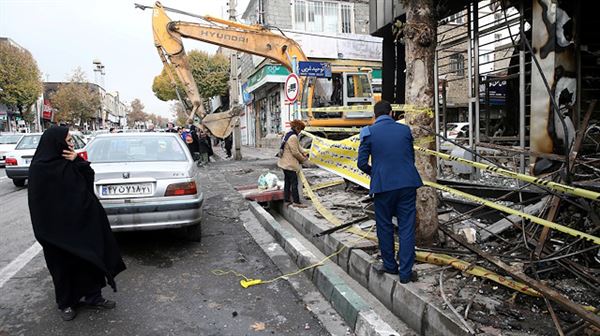Iran gave a glimpse on Wednesday into the scale of what may have been the biggest anti-government protests in the 40-year history of the Islamic Repub
Iran gave a glimpse on Wednesday into the scale of what may have been the biggest anti-government protests in the 40-year history of the Islamic Republic, with an official saying 200,000 people had taken part and a lawmaker saying 7,000 were arrested.
Supreme Leader Ayatollah Ali Khamenei, in his strongest remarks since the unrest peaked, described the two weeks of violence as the work of a “very dangerous conspiracy”.
He also said the unrest, initially sparked by fuel price hikes but which then spiralled, had been completely quelled.
Iran has given no official death toll, but Amnesty International said this week it had documented the deaths of at least 143 protesters. Tehran has rejected this figure.
A number anywhere close to that would make it the deadliest anti-government unrest at least since the authorities put down “Green Revolution” protests that surrounded the disputed 2009 presidential election, and probably since the 1979 Islamic Revolution that toppled the shah and swept clerics to power.
Details of the unrest have been difficult to report from outside Iran, especially after the authorities shut down the internet for a week.
Residents and state media said mobile Internet was restored in the capital Tehran and several other areas on Wednesday, after fixed-line internet was partially reconnected on Monday.
The Intelligence Ministry said at least eight people linked to the U.S. Central Intelligence Agency had been arrested during the unrest.
“These elements had received CIA-funded training in various countries under the cover of becoming citizen-journalists,” the state news agency IRNA quoted the ministry as saying.
“Six were arrested while attending the riots and carrying out (CIA) orders, and two while trying to…send information abroad,” a ministry statement said.
The violence comes as Iran’s economy has been hit by tighter U.S. sanctions that have slashed oil exports this year, and as mass demonstrations have erupted in Iraq and Lebanon against governments built around prominent pro-Iran factions.
“THUGS”
The Tehran government has blamed “thugs” linked to its opponents in exile and the country’s main foreign foes, namely the United States, Israel and Saudi Arabia.
Disturbances began on Nov. 15 after the government of the Islamic Republic, one of OPEC’s biggest oil producers, announced gasoline price hikes. But protests quickly turned political, with demonstrators demanding the removal of top leaders.
“A deep, vast and very dangerous conspiracy that a lot of money had been spent on…was destroyed by the people,” Khamenei told a meeting with the paramilitary Basij force that took part in the crackdown on protests, his official website said.
Interior Minister Abdolreza Rahmani Fazli said 731 banks, 70 petrol stations and 140 government sites had been torched. More than 50 bases used by security forces were attacked, he said, in remarks reported by IRNA.
According to IRNA, Rahmani Fazli said up to 200,000 people took part nationwide in the unrest. Hossein Naqavi-Hosseini, a member of parliament’s national security committee, said about 7,000 people had been arrested, news website Entekhab reported.
Ordinary Iranians have faced an increasingly tough struggle to make ends meet since last year when Washington quit a nuclear deal between Iran and world powers and reimposed sanctions on Iran. Under the pact, U.S. and other international sanctions on Iran were eased in return for curbs on its nuclear programme.
The U.S. administration says sanctions aim to force Tehran to negotiate a more comprehensive deal, covering everything from its nuclear ambitions to Iran’s activities around the Middle East. Iran says it won’t hold talks until sanctions are lifted.
Daily gasoline consumption has fallen by about 20 million litres a day since prices were hiked, Oil Minister Bijan Zanganeh said, according to the semi-official ISNA news agency. Daily consumption had been about 98 million litres before the rise, state fuel distribution company NIOPDC said on Tuesday.
Washington’s policy of imposing “maximum pressure” has hammered Iran’s oil-reliant economy, which has been struggling to deal with rising inflation, growing unemployment, a slumping rial currency and state corruption.
The government said the gasoline price rises of at least 50% aimed to raise about $2.55 billion a year to fund extra subsidies for 18 million families on low incomes.
